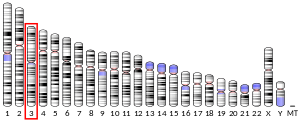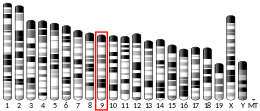SLCO2A1
Solute carrier organic anion transporter family, member 2A1 also known as the prostaglandin transporter (PGT) is a protein that in humans is encoded by the SLCO2A1 gene.[5]
This gene encodes a prostaglandin transporter that is a member of the 12-membrane-spanning organic anion-transporting polypeptide superfamily of transporters. The encoded protein may be involved in mediating the uptake and clearance of prostaglandins in numerous tissues.[5]
Clinical relevance
Mutations in this gene have been shown to cause primary hypertrophic osteoarthropathy.[6]
References
- 1 2 3 GRCh38: Ensembl release 89: ENSG00000174640 - Ensembl, May 2017
- 1 2 3 GRCm38: Ensembl release 89: ENSMUSG00000032548 - Ensembl, May 2017
- ↑ "Human PubMed Reference:".
- ↑ "Mouse PubMed Reference:".
- 1 2 "Entrez Gene: Solute carrier organic anion transporter family, member 2A1". Retrieved 2011-12-30.
- ↑ Zhang Z, Xia W, He J, Zhang Z, Ke Y, Yue H, Wang C, Zhang H, Gu J, Hu W, Fu W, Hu Y, Li M, Liu Y (January 2012). "Exome sequencing identifies SLCO2A1 mutations as a cause of primary hypertrophic osteoarthropathy". American Journal of Human Genetics. 90 (1): 125–32. doi:10.1016/j.ajhg.2011.11.019. PMID 22197487.
Further reading
- Hagenbuch B, Meier PJ (February 2004). "Organic anion transporting polypeptides of the OATP/ SLC21 family: phylogenetic classification as OATP/ SLCO superfamily, new nomenclature and molecular/functional properties". Pflügers Archiv. 447 (5): 653–65. doi:10.1007/s00424-003-1168-y. PMID 14579113.
- Huang CS, Huang MJ, Lin MS, Yang SS, Teng HC, Tang KS (January 2005). "Genetic factors related to unconjugated hyperbilirubinemia amongst adults". Pharmacogenetics and Genomics. 15 (1): 43–50. doi:10.1097/01213011-200501000-00007. PMID 15864125.
- Kang J, Chapdelaine P, Laberge PY, Fortier MA (March 2006). "Functional characterization of prostaglandin transporter and terminal prostaglandin synthases during decidualization of human endometrial stromal cells". Human Reproduction. 21 (3): 592–9. doi:10.1093/humrep/dei400. PMID 16339169.
- Choi K, Zhuang H, Crain B, Doré S (March 2008). "Expression and localization of prostaglandin transporter in Alzheimer disease brains and age-matched controls". Journal of Neuroimmunology. 195 (1–2): 81–7. doi:10.1016/j.jneuroim.2008.01.014. PMC 2365511. PMID 18353443.
- Holla VR, Backlund MG, Yang P, Newman RA, DuBois RN (July 2008). "Regulation of prostaglandin transporters in colorectal neoplasia". Cancer Prevention Research. 1 (2): 93–9. doi:10.1158/1940-6207.CAPR-07-0009. PMID 19138942.
- Chi Y, Schuster VL (April 2010). "The prostaglandin transporter PGT transports PGH(2)". Biochemical and Biophysical Research Communications. 395 (2): 168–72. doi:10.1016/j.bbrc.2010.03.108. PMC 4410840. PMID 20346915.
- Breuiller-Fouché M, Leroy MJ, Dubois O, Reinaud P, Chissey A, Qi H, Germain G, Fortier MA, Charpigny G (July 2010). "Differential expression of the enzymatic system controlling synthesis, metabolism, and transport of PGF2 alpha in human fetal membranes". Biology of Reproduction. 83 (1): 155–62. doi:10.1095/biolreprod.109.080390. PMID 20357271.
- Lu R, Kanai N, Bao Y, Schuster VL (September 1996). "Cloning, in vitro expression, and tissue distribution of a human prostaglandin transporter cDNA(hPGT)". The Journal of Clinical Investigation. 98 (5): 1142–9. doi:10.1172/JCI118897. PMC 507536. PMID 8787677.
- Lu R, Schuster VL (May 1998). "Molecular cloning of the gene for the human prostaglandin transporter hPGT: gene organization, promoter activity, and chromosomal localization". Biochemical and Biophysical Research Communications. 246 (3): 805–12. doi:10.1006/bbrc.1998.8715. PMID 9618293.
- Topper JN, Cai J, Stavrakis G, Anderson KR, Woolf EA, Sampson BA, Schoen FJ, Falb D, Gimbrone MA (December 1998). "Human prostaglandin transporter gene (hPGT) is regulated by fluid mechanical stimuli in cultured endothelial cells and expressed in vascular endothelium in vivo". Circulation. 98 (22): 2396–403. doi:10.1161/01.CIR.98.22.2396. PMID 9832484.
This article incorporates text from the United States National Library of Medicine, which is in the public domain.
This article is issued from
Wikipedia.
The text is licensed under Creative Commons - Attribution - Sharealike.
Additional terms may apply for the media files.



